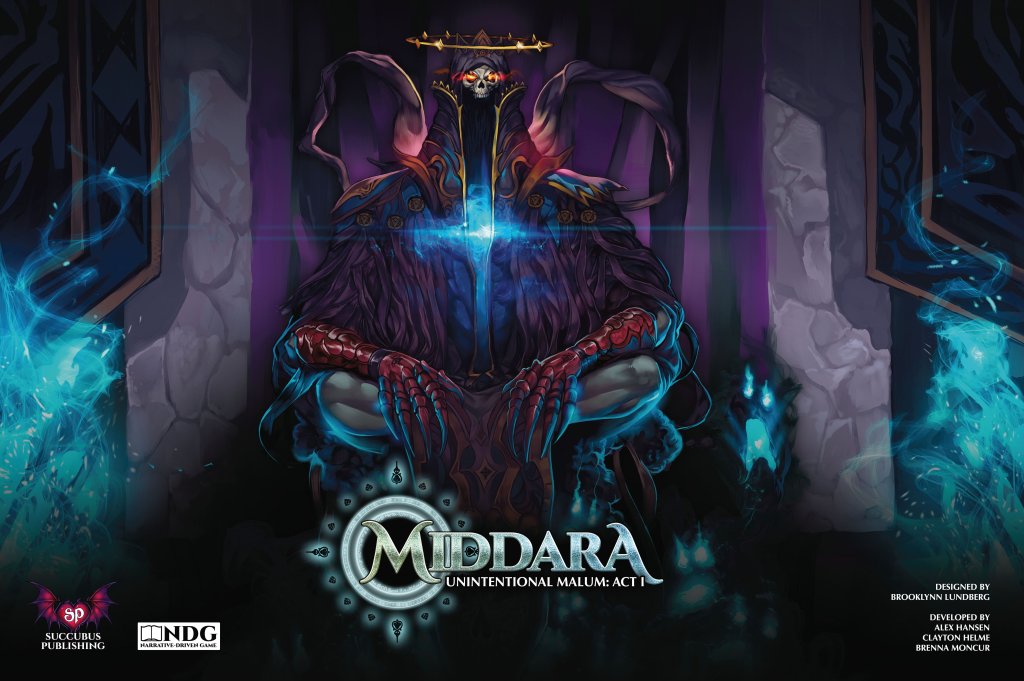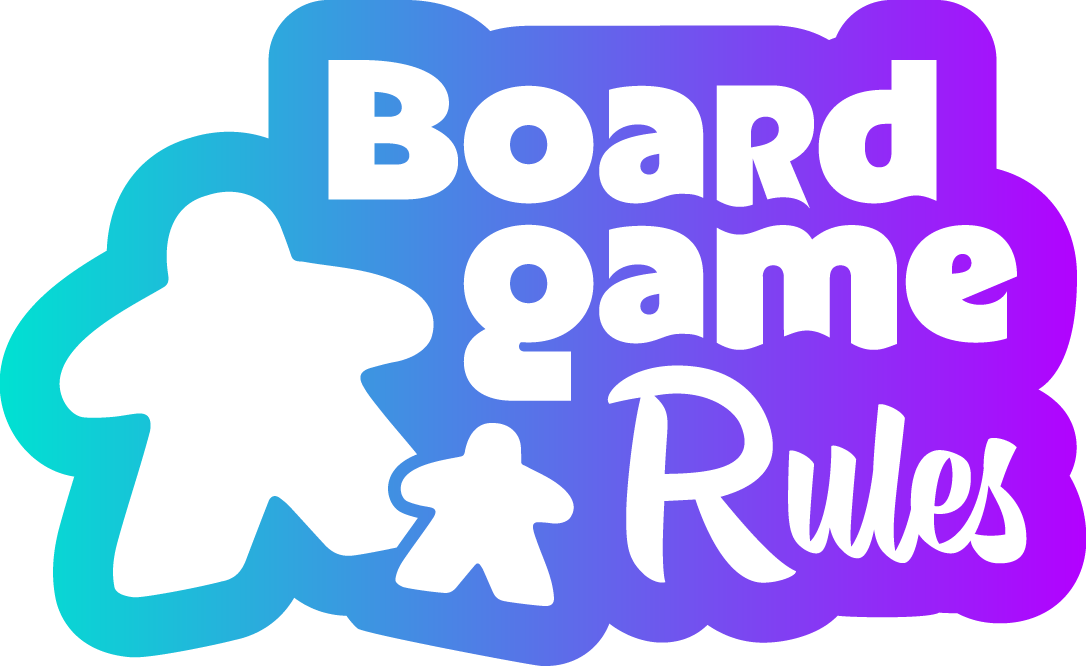Middara: Unintentional Malum – Act 1
2019
Immerse yourself in Middara - an epic, cooperative adventure board game with 90+ hours of narrative content, unique dice-based combat, and endless character customization.
60
minutes
1 - 4
player(s)
15+
Heavy


About the game
‘Middara: Unintentional Malum – Act 1’ is a captivating and intricate cooperative board game that offers a deep dive into a world filled with magic, monsters, and mystery. It is a narrative-driven adventure, set in a fantastical realm known as Middara, that borrows elements from modern-day earth and infuses them with a unique blend of fantasy.
The game is set in Middara, an island city-state floating in a parallel reality. Here, magic and technology coexist, and monsters roam the streets. The players take on the roles of individuals drawn into a dark and sprawling saga of discovery and danger, where their decisions will shape the destiny of Middara. With an impressive array of characters, each with their own skills and abilities, the game offers an immersive role-playing experience.
Read More
Setup and rules summary
Game components Unboxing the fun!
Middara: Unintentional Malum – Act 1 is a rich, narrative-driven board game that comes with a plethora of components. Here are the components included in the game, along with a brief explanation of their function and interaction:
1. Rulebook: This is the guide to understanding how to play the game. It includes explanations of the components, setup instructions, game rules, and scenario descriptions. It is a vital resource for players.
2. Adventure Book: This book contains the narrative for the game. Players will read from this book at various points during play, making choices that affect the game’s progression and outcome.
3. Dice: The game includes a variety of dice (D6, D8, D10, D12) used for combat, skill checks, and other in-game actions. The type of die used often depends on the character’s abilities or weapons.
4. Miniatures: These represent the players’ characters and the game’s enemies. Miniatures move around the game board to indicate location and engage in combat.
5. Game Board: The board is modular, made up of tiles that can be rearranged for different scenarios. It provides the physical space where the characters and enemies move and interact.
6. Character Mats: Each player has a character mat that tracks their character’s health, abilities, equipment, and other pertinent information.
7. Tokens: These come in various shapes and colors, representing different in-game effects, items, and statuses. They are placed on the game board or character mats as needed.
8. Cards: There are several types of cards in the game, including item cards, ability cards, and event cards. These are drawn or acquired by players during the game and can affect gameplay in various ways.
9. Stands: Stands are used to hold certain tokens, making them stand upright on the game board. This is often used for tokens representing large or important objects or entities.
10. Counters: These are used to keep track of various game aspects, such as time, player progress, and enemy health. They can be placed on the game board, character mats, or other relevant locations.
Each of these components interacts with others to create a dynamic and immersive game experience. The narrative, characters, and actions are all influenced by the players’ decisions, making ‘Middara: Unintentional Malum – Act 1’ a game of strategy, luck, and storytelling.
Game setup Lay it out, line it up, let’s go
Middara: Unintentional Malum – Act 1 is an immersive board game that combines elements of role-playing and strategy. To set the game up correctly, follow these step-by-step instructions:
-
Unbox the Game: Take out all the components from the box, including game board, player cards, tokens, dice, and miniatures. Make sure you have everything in the list provided in the game rules booklet.
-
Set Up the Game Board: Place the game board in the center of the table where all players can easily reach it. The game board represents the world of Middara, and each square represents a different location.
-
Prepare Player Materials: Each player chooses a character and takes the corresponding character card, starting equipment card and miniature. Each player also receives 10 stamina and 5 health tokens, which are placed on their character card.
-
Place the Tokens: Separate the tokens into different types. Place the tokens next to the game board within easy reach of all players. These will be used to keep track of character’s health, stamina, and other resources.
-
Set Up the Dice: Put the dice next to the game board. During the game, players will roll the dice to resolve combat and other challenges.
-
Determine the First Player: All players roll a dice. The player with the highest roll becomes the first player and takes the first player token.
-
Prepare the Adventure Deck: Shuffle the adventure cards and place them face down near the game board. These cards will be drawn during the game to create unexpected events and challenges.
-
Set Up the Encounter Deck: Based on the adventure chosen, set up the appropriate encounter deck. This deck will determine the enemies players will face during their journey.
The setup is now complete. You’re ready to delve into the adventurous world of Middara: Unintentional Malum – Act 1. Remember, the key to success in this game is cooperation and strategy. Good luck!
Game flow Round and round we go
Middara: Unintentional Malum – Act 1 is a cooperative storytelling board game with RPG elements. The game play is divided into a series of rounds, each consisting of multiple phases. Here’s a detailed breakdown of the game’s structure:
1. Initiative Phase:
- Draw Initiative: At the start of each round, players draw an initiative card for each adventurer and encounter in the game. The order of these cards determines the turn order for that round.
- Sort Initiative: The drawn cards are then sorted in descending order to establish the initiative sequence. Players and encounters will take their turns based on this sequence.
2. Player Turn: Once the initiative order is established, players take their turns. Each player turn is divided into two parts:
- Start of Turn: At the start of each turn, players resolve any effects that occur “at the start of turn”.
- Action Phase: Players can perform two actions during their turn. These actions can be Move, Attack, Interact, or use an Ability. Players can perform the same action twice.
3. Encounter Turn: Encounters also take turns based on the initiative order. An encounter turn is divided into two parts:
- Start of Turn: Similar to player turns, any effects that take place “at the start of turn” are resolved.
- AI Phase: During this phase, the encounter follows its AI instructions provided on its corresponding card. The instructions guide the encounter’s actions which usually involve moving and attacking.
4. End of Round: After all players and encounters have taken their turns, the round ends. Players then resolve any effects that take place “at the end of round”.
5. Start of New Round: If the game has not reached a conclusion, a new round begins starting again with the Initiative Phase.
The game continues in this manner until players either fulfill their objective or fail their mission, as per the game’s storyline.
Players'turn One turn to rule them all
Middara: Unintentional Malum – Act 1 is an immersive board game, where players take turns to navigate through a narrative-driven adventure. Each player’s turn is comprised of two main phases: the Initiative Phase and the Action Phase. During these phases, players can perform a variety of actions that will affect the gameplay. Below, we break down these phases and the potential actions a player can take.
1. Initiative Phase
In this phase, players determine the order in which they will take their turns. The player with the highest initiative value goes first. Initiative can be influenced by a character’s abilities or equipment.
2. Action Phase
During the Action Phase, a player can perform two actions from the following list:
- Move: The player can move their character up to the number of spaces equal to their movement value. Terrain, obstacles, and enemies can affect movement.
- Attack: The player can choose to attack an enemy within their character’s range. The success of the attack depends on a dice roll, along with any relevant skills, abilities, and equipment.
- Interact: The player can interact with objects or non-player characters (NPCs) in their vicinity. This can lead to dialogue, item acquisition, or triggering certain events.
- Use an Ability: If the player’s character has special abilities, they can be used during this phase. The effects of these abilities vary widely and can greatly impact the gameplay.
- Rest: The player can choose to rest their character, restoring a portion of their health and/or stamina.
It’s important to note that these actions can be performed in any order and the same action can be performed twice.
Strategy plays a crucial role in Middara. Deciding when to attack, when to rest, and how to best use abilities can be the difference between success and defeat. Additionally, interacting with the game world and NPCs can lead to unexpected outcomes, making every decision matter. The game encourages players to work together, forming strategies to overcome challenges and progress through the narrative.
End of the game All good games must come to an end
The game of ‘Middara: Unintentional Malum – Act 1’ comes to an end when all the scenarios outlined in the Adventure Book have been played through. The game is divided into chapters, with each chapter consisting of several scenarios. Players need to complete all these scenarios to end the game.
Victory Conditions:
In ‘Middara: Unintentional Malum – Act 1’, victory is achieved in different ways depending on the scenario being played. Each scenario in the Adventure Book has its own victory and defeat conditions, which are outlined at the start of each scenario. Some common victory conditions include:
- Eliminating all enemies: Players win the game if they are able to defeat all the enemies on the game board.
- Fulfilling a specific objective: Some scenarios require players to achieve a certain objective, such as collecting a particular item or reaching a certain location on the board.
Note, however, that players do not necessarily lose the game if they fail a scenario. They will simply continue with the next scenario in the Adventure Book, with the failure having an impact on the ongoing story of the game.
Actions before Final Scoring:
Before final scoring, players must complete the following actions:
- Check for any remaining enemies: Players should make sure that all the enemies on the game board have been defeated. Any remaining enemies can affect the final score.
- Check for any unresolved objectives: Players should make sure that they have fulfilled all the objectives outlined in the scenario. Unfulfilled objectives can also affect the final score.
- Tally up points: Players should tally up their points based on the number of enemies defeated, objectives fulfilled, and any bonus points outlined in the scenario.
- Check the Adventure Book: After tallying up their points, players should consult the Adventure Book to determine how their actions have impacted the ongoing story of the game.
It’s worth noting that ‘Middara: Unintentional Malum – Act 1’ is a narrative-driven game, and as such, the emphasis is not as much on scoring points as it is on experiencing and influencing the unfolding story. Therefore, while victory and defeat conditions are important, they are not the sole focus of the game.
Scoring Did you outsmart your rivals?
Middara: Unintentional Malum – Act 1 has a unique scoring system that focuses on players’ progress throughout the game. The scoring system is based on objective achievement, combat success, and story progression.
Objective Achievement:
During the game, players are given various objectives. Completing these objectives earns the players Adventure Points (AP). The following rules apply:
- Each completed objective earns players a specific amount of AP, as stated in the adventure book.
- Failure to complete an objective results in no AP awarded for that objective.
- Some objectives may have bonus AP if completed under certain conditions. These are specified in the adventure book.
Combat Success:
In addition to objectives, players earn AP through successful combat encounters. Combat success points are awarded as follows:
- Each defeated enemy awards a certain amount of AP, as mentioned on the enemy’s stat card.
- Players may earn bonus AP for defeating enemies using specific strategies or abilities, as detailed in the adventure book.
Story Progression:
Progressing through the story is another key way to earn AP in Middara. Players earn points as follows:
- Completing a chapter awards a set amount of AP, as noted in the adventure book.
- Additional AP may be awarded for making certain decisions or uncovering specific story elements.
Tie-Breaking Rules:
In case of a tie, the following rules apply:
- The player with the most completed objectives wins.
- If there is still a tie, the player who earned the most AP from combat is the winner.
- If a tie persists, the player with the most AP from story progression wins.
- If there is still a tie, the player who played the game as the first player is the winner.
Remember, Middara is a cooperative game, so while scoring can add a competitive edge, the primary focus is on working together to overcome the challenges presented by the game.
Particular Cases and Exceptions Wait… is that legal?
Middara: Unintentional Malum – Act 1 is a cooperative storytelling board game with a unique set of rules and mechanics. It’s a highly complex game, and there are several special rules, exceptions, and clarifications that players should be aware of.
Special Rule: Encounter Setup
During the setup of an encounter, all figures must be placed on the map in their respective spots as indicated by the scenario book. The rulebook might not explicitly state this, but it’s essential for maintaining game balance.
Special Rule: Equipment Cards
Equipment cards are not discarded when used. Instead, they are flipped over to indicate they have been used, and they can be refreshed at the start of the player’s next turn. This is an exception to the general rule of discarding used cards.
- Rule Clarification: Initiative
- Rule Clarification: Damage and Healing
It’s important to understand that a character’s initiative is determined by adding the total value of their speed to a dice roll. This total determines the turn order for each round, with the highest total going first. In the event of a tie, the player with the highest speed stat goes first.
Damage and healing are calculated differently in Middara. When a character takes damage, the player subtracts their defense from the total damage done and then subtracts that number from their health. When healing, players add the total heal amount to their current health, but never exceeding their maximum health.
Exception: Monster Abilities
Some monsters have special abilities that can change or ignore certain rules. Always read the monster’s ability card carefully, as it may override the general rules of the game.
Exception: Story Events
At certain points in the game, players may trigger story events that can change the game’s rules or the state of play. These events are usually triggered by exploring certain areas or interacting with certain items, and they can significantly alter the course of the game. Again, these events can override the general rules, so pay close attention to the text.
Tips and tricks Play smarter, not harder!
Advanced Strategies:
Middara: Unintentional Malum – Act 1 is a complex game with many strategies. However, some advanced strategies can help you get ahead:
- Plan ahead: It’s crucial to think ahead in Middara. While it’s impossible to predict everything that will happen, having a general plan can make a big difference.
- Teamwork: Middara is a cooperative game, so it’s essential to work with your team. Make sure everyone is on the same page and has a role to play.
- Use Terrain Effectively: Terrain can have a significant impact on gameplay. Use it to your advantage whenever possible.
Beginner Tips:
If you’re new to Middara, these tips can help you get started:
- Learn the rules: Middara has many rules, so it’s important to read the rulebook thoroughly before you start playing.
- Start slow: Don’t rush into anything. Take your time to understand the game mechanics and the characters’ abilities.
- Ask for help: If you’re unsure about something, don’t hesitate to ask a more experienced player for advice.
Common Mistakes to Avoid:
Here are some common mistakes that new players often make in Middara:
- Ignoring the story: The story in Middara is crucial. If you ignore it, you may miss out on vital information and strategies.
- Not using abilities properly: Each character has unique abilities. Failing to use these abilities correctly can lead to defeat.
- Not working as a team: As mentioned before, teamwork is critical in Middara. If you don’t work together, you’re unlikely to succeed.
Optimizing Gameplay:
Finally, here are some tips for optimizing your gameplay in Middara:
- Use your abilities wisely: Don’t waste your abilities. Use them at the right time and in the right situations.
- Keep track of your inventory: Your inventory is crucial. Make sure you’re always aware of what you have and what you need.
- Communicate: Communication is key in Middara. Always keep your team informed about what you’re doing and why.
